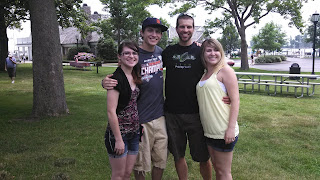I want to say "Thank you" to my classmates and a special "Thank you" to Dr. D. for her patience and understanding! Week one begins with excitement and nerves in meeting a new professor and classmates. There is always the hope of a classmate from a previous course. Our group had some great discussion and I appreciate the sharing of experiences. This past 8 weeks was very unusual with challenges of balancing work, school and personal. September was very busy with the start of the 2013-2014 school year and my oldest sons wedding. I need to say "Thank you" to my family and staff throughout this time they have been a great support system to me encouraging me to continue my dreams!
 |
| My awesome children! |

My son and his beautiful bride.




.jpg)
 Milford Criterion 2013 our home town. My son finished 3rd with family cheering at the finish line!
Milford Criterion 2013 our home town. My son finished 3rd with family cheering at the finish line!

